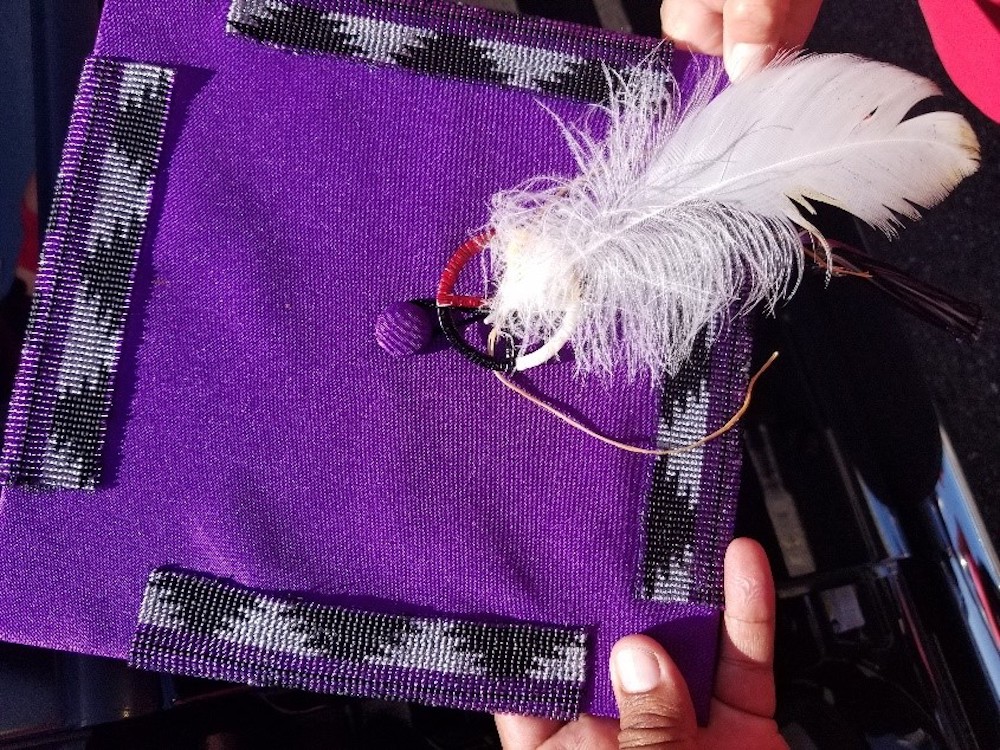
- Details
- By Levi Rickert
Opinion. Last Monday, Native News Online held its first ever Founder’s Circle meeting with donors to our publication. We invited members to a Zoom call where they could engage with me and members of our staff. Some 30 members signed on for a conversation about what’s going on in Indian Country.
During the call, I mentioned to the group that it is graduation season and it seems like every year we report on a high school or college that prohibits Native American graduates from wearing eagle feathers or other tribal regalia during the commencement ceremony.
Unbeknownst to me, the next day we became aware of a lawsuit filed against an Oklahoma school district in an affluent suburb of Tulsa. The resulting article (“Native American High School Graduate Sues School District for Forceful Removal of Sacred Eagle Plume at Graduation”) told the story of Lena’ Black, an enrolled member of the Otoe-Missouria Tribe and of Osage descent, who was suing the Broken Arrow School District for violating her rights to free exercise of religion and freedom of speech.
During Black’s May 2022 high school commencement, school officials attempted to forcefully remove a sacred eagle plume she wore on her cap. The eagle plume was given to Black by a respected tribal elder when she was three years old. The plume was sacred to Black because it represents the prayers of the Otoe-Missouria people for her life and protection.
According to the lawsuit, while assembling in a waiting line to walk onto the school’s football field, Black was accosted by two school officials who told her she would have to remove the eagle plume from mortarboard because it was a prohibited “decoration.”
Black explained the significance of the plume to her and that it was not a decoration. They ignored her explanation and attempted to forcibly remove the eagle plume from her mortarboard.
The two school officials physically touched the eagle plume during the encounter, causing it physical and ceremonial damage.
“Ms. Black, who suffers from an anxiety disorder, was distraught,” the lawsuit reads. “In the presence of other students, faculty, and staff, Ms. Black collapsed to the ground while the school officials continued to grab at her eagle plume and mortarboard.”
In the lawsuit, Ms. Black contends her right to free exercise of religion and free speech were infringed upon. She also seeks damages for the school district’s negligence and the intentional infliction of emotional distress.
On Wednesday, I spoke to representatives from the Otoe-Missouria Tribe and Osage Nation. Both officials relayed that Black comes from a traditional Native family and is a Southern Cloth Dancer and a Gourd Dancer. She currently serves as Red Rock Creek Princess, which is a formal role in her tribal community.
As a journalist, it is not my role to litigate lawsuits in the press. Lawsuits are argued within the legal system, which may at some point include a courtroom. As I read the lawsuit, though, I felt the pain of Ms. Black’s distress. It strikes me she was hurt to the core of who she is as a Native American.
Removing an eagle plume from a Native American’s attire would be comparable to taking a crucifix necklace from around the neck of a Christian. Eagle feathers are considered sacred, and Native Americans have a special connection with them and a legal right to possess them. In fact, two laws make it a federal offense for a non-tribal citizen to possess one in the United States.
The Lena’ Black incident is just one of many cases involving schools denying Native American students their rights to have an eagle feather attached to their mortarboard. Native American students shouldn't have to sacrifice their Indigenous identity when they're celebrating their academic success.
On last Friday’s Native Bidaske, we interviewed two of the attorneys who crafted the lawsuit: Shoney Blake (Choctaw) from Pipestem Law and Morgan Saunders from the Native American Rights Fund (NARF). Saunders told us that she has already received three calls from Native American students from three different states who had experienced the same resistance to wearing tribal regalia during graduation ceremonies.
It is time for states to enact laws that allow for Native American students to celebrate their culture and heritage with eagle feathers or other regalia. The problem extends far beyond Lena’ Black’s case.
Thayék gde nwéndëmen - We are all related.
Editor's Note: To join our Founder's Cirlce: CLICK
More Stories Like This
The SAVE America Act Threatens Native Voting Rights — We Must Fight BackThe Presidential Election of 1789
Cherokee Nation: Telling the Full Story During Black History Month
Jesse Jackson Changed Politics for the Better
Native News Online at 15: Humble Beginnings, Unwavering Mission
Help us defend tribal sovereignty.
At Native News Online, our mission is rooted in telling the stories that strengthen sovereignty and uplift Indigenous voices — not just at year’s end, but every single day.
Because of your generosity last year, we were able to keep our reporters on the ground in tribal communities, at national gatherings and in the halls of Congress — covering the issues that matter most to Indian Country: sovereignty, culture, education, health and economic opportunity.
That support sustained us through a tough year in 2025. Now, as we look to the year ahead, we need your help right now to ensure warrior journalism remains strong — reporting that defends tribal sovereignty, amplifies Native truth, and holds power accountable.
 The stakes couldn't be higher. Your support keeps Native voices heard, Native stories told and Native sovereignty defended.
The stakes couldn't be higher. Your support keeps Native voices heard, Native stories told and Native sovereignty defended.
Stand with Warrior Journalism today.
Levi Rickert (Potawatomi), Editor & Publisher


